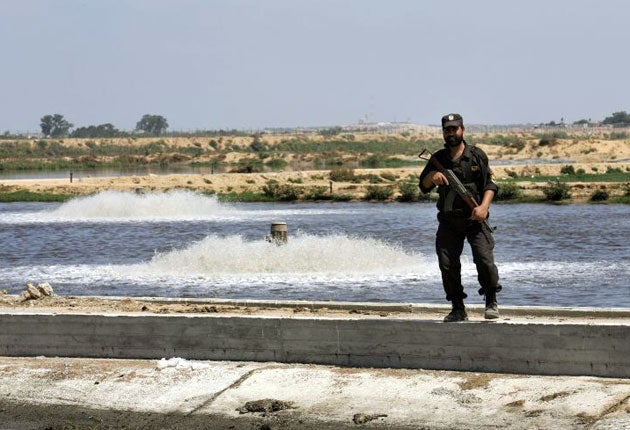Israeli strikes leave Blair project with major repairs
Gaza plant designed to protect 10,000 lives suffers damage

Your support helps us to tell the story
From reproductive rights to climate change to Big Tech, The Independent is on the ground when the story is developing. Whether it's investigating the financials of Elon Musk's pro-Trump PAC or producing our latest documentary, 'The A Word', which shines a light on the American women fighting for reproductive rights, we know how important it is to parse out the facts from the messaging.
At such a critical moment in US history, we need reporters on the ground. Your donation allows us to keep sending journalists to speak to both sides of the story.
The Independent is trusted by Americans across the entire political spectrum. And unlike many other quality news outlets, we choose not to lock Americans out of our reporting and analysis with paywalls. We believe quality journalism should be available to everyone, paid for by those who can afford it.
Your support makes all the difference.One of Tony Blair's flagship projects as international Middle East envoy – and one of his most concrete achievements to date – was emergency work on a sewage plant in northern Gaza to stop it overflowing and endangering the lives of some 10,000 people.
Now, it has emerged that Israeli forces severely damaged parts of the plant during their 22-day offensive and the project – which was due for completion at the end of this week – has been delayed for two months, with repairs expected to cost $200,000 (£140,000).
Although the damage to Mr Blair's project close to the border with Israel in northern Gaza is modest compared with the overall destruction across the Strip and a Gazan death toll put by the Palestinian Ministry of Health at more than 1,200, it has considerable political and diplomatic significance. It is virtually the only major development aid project which has been allowed to go ahead since Israel imposed its blockade on Gaza 18 months ago.
Mr Blair, who has already raised the issue with Israeli Prime Minister Ehud Olmert and Defence Minister Ehud Barak, had worked intensively to secure Israeli approval for vital components to be brought into Gaza for the works despite Israel's 18-month-long economic siege. The bulk of the North Gaza emergency sewage treatment project was due for completion in early January and the rest by the end of this week but it is now unlikely to be completed until March at the earliest.
The damage to the project also prolongs the period before pressure can be relieved on the waste water lagoons at Beit Lahiya. This is necessary to remove the risk of a repeat of the flood which engulfed a nearby Bedouin encampment in March 2007, when five Palestinians were killed in the overflow of raw sewage after the earth walls of the cesspool collapsed and another 1,500 local residents were displaced. A lesser risk is that the level of the sewage lakes will reach the overflow which would pump the sewage on to the crowded streets of Jabalya, another northern Gaza town.
Officials in the Quartet envoy's office have already begun fresh negotiations with Israeli ministers to bring in replacement components for the repairs though it was not yet clear who will supply the concrete after the destruction of the Abu Eida works. Gaza's biggest ready-mix concrete factory, allowed to import cement especially to supply the sewage project, has also been flattened by Israeli bombing. Mr Blair's office confirmed yesterday that the Abu Eida works had been its earmarked concrete supplier.
According to a preliminary Palestinian Water Authority assessment, seen by The Independent, the main damage during Israel's military campaign was inflicted on the infiltration basins, including their electrical control room, and the main ductile iron pressure pipe. Their report claims that the upper chambers at five of the basins were "deliberately destroyed" by bulldozers and that fuel tanks have been badly damaged with all the diesel being poured out and one tank being thrown into one of the basins, with consequent pollution to ground water.
The PWA report also says that there were four air strikes along the route of the ductile pipe, including one which formed a "huge hole", now filled with water. The report acknowledges that it has so far been difficult to estimate damage to the pressure line but cites eye witnesses as saying that it was partly damaged.
Meanwhile, Gaza's Coastal Municipal Water Utility says $6m will be needed for reconstruction after war damage to the already stricken water and sewerage network, including the destruction of three wells serving around 50,000 residents in northern Gaza.
But the Israeli military appears to have honoured a special request from Mr Blair at the outset of the war not to endanger the lives of residents by attacking the Beit Lahiya sewage lakes themselves. This was strongly reinforced by a warning from the World Bank that 10,000 people were at risk of drowning by the combination of possible bombardment and the inability to operate pumps because of the now chronic shortage of electricity and fuel in Gaza.
A UN report this week said water and sewage supplies were improving in northern and central Gaza with 70 per cent of the system functioning but warned of continued shortages of drinking water and overflowing sewage.
Join our commenting forum
Join thought-provoking conversations, follow other Independent readers and see their replies
Comments